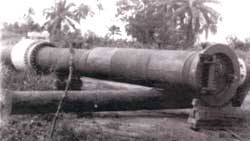Beginning afresh
 AFTER a four-year absence from Ogoniland and some soul-searching, Anglo-Shell, the multinational oil corporation, which had always denied responsibility for environmental pollution in Ogoniland and elsewhere in the Niger Delta, has shelved its earlier stance, accepting "to clean up all oil spills" in its areas of operation.
AFTER a four-year absence from Ogoniland and some soul-searching, Anglo-Shell, the multinational oil corporation, which had always denied responsibility for environmental pollution in Ogoniland and elsewhere in the Niger Delta, has shelved its earlier stance, accepting "to clean up all oil spills" in its areas of operation.
In a bid to return to Ogoniland to resume oil exploration, bring some peace to the oil fields and assuage its corporate conscience, the oil company has embarked on an ambitious, comprehensive scheme of environmental improvements and community related projects, which is expected to gulp close to one billion us dollars. The expensive programme is aimed at addressing the three-fold grievances of the Ogonis and others, which centre on frequent oil spills, ceaseless gas flaring and general neglect.
"When we are able to return to Ogoniland, our first priority is not to restart production, but to clean up all oil spills whether or not due to sabotage that have happened since the company withdrew its staff in 1993, and make safe all our facilities," Shell said in a statement. Shell's plans include upgrading its two oil export terminals in Bonny and Forcados at a cost of us $850 million. This will ensure that no polluted water is discharged into inland waters after 1998. The company, in line with latest safety and environmental standards, also plans to replace and bury all its surface oil pipelines currently on land and swamp many of which are worn-out and are known to have been responsible for much of the oil spills in Ogoniland and other communities in the Niger Delta.
To reduce the incidence of gas flaring, a US $4 billion liquified natural gas project, with Shell as a major shareholder is being built to process Nigeria's associated gas (which comes as a by-product of crude oil) for export by 1999 and reduce gas flaring in the entire Niger Delta basin by 45 per cent.
On its part, the Nigerian government has imposed a fine on oil companies to discourage gas flaring. Prodded by local environmentalists, it has also begun updating the country's environmental laws, while a national oil spill plan is on the drawing board to cope with future emergencies. Since 1993, three per cent of the oil revenue has been set aside for development projects in the Niger Delta.
Meanwhile, the Ogonis and other ethnic groups in the delta basin prefer to adopt a wait-and-watch attitude on Shell's ambitious environment improvement programme. "We have been deceived for too long," says David Akpoborora, a 60-year-old farmer. "I won't say anything about Shell's plan until there is enough concrete evidence to convince me of their sincerity," he added.
